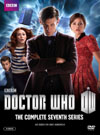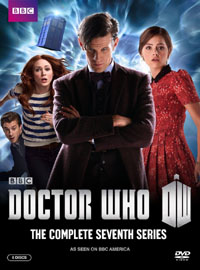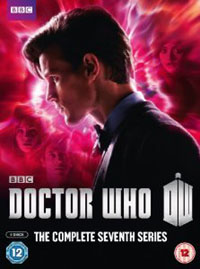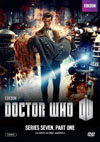DVD Extras for this story on the 15-episode box sets include:
The fundamental thing wrong with the episode is that none of the fictional characters in it agree with that choice. The Doctor, Amy, Rory, and River Song all want to continue to hang out with each other forever. So what happens? Well, writer Steven Moffat then spends 46 minutes victimizing the characters into the outcome of being separated for the rest of Amy and Rory's lives. It's massively overcomplicated. I can and will take issue with his view of time, but the story's problems don't end there. Even looking at it through Moffat's view of time will reveal plot holes, contradictory logic, and a penchant for making up any contrivance at the spur of the moment ...all to lead them back to being victimized. And at no point does it feel like that was a worthy or necessary goal in the first place. It's impossible to follow this one and maintain a belief in the truth of the story's world and its rules because the story doesn't stick to them, and the characters are fully motivated to step through the gaping holes of logic they should be finding, pursuing simple solutions. There is no satisfaction to be had from any of the events in this one. The previous story "The Power of Three" was particularly good at highlighting the regulars' choices. This story craps all over choice at every turn.
Elements Losing DrawSo let's start at the beginning. We're in New York, and those frozen-only-while-you-look time-sucking weeping angels are here spooking havoc. Our traditional victim for the pre-title teaser segment is a 1930's detective listlessly dragging himself through his lifestyle of cliché cynicism. Guess what; angels are after him at the Winter Quay. Very predictable dynamics. In a rare smart move, it isn't the expected end to this sequence that causes the cut to the titles. Instead it's the cool thought that the infamous Statue of Liberty might in fact be a huge angel that sends us off. And so this story works for about 10 seconds, until you realize there's not much that the Statue of Liberty can do as an angel. In Ghostbusters II we saw it stomping through the streets, but if it tries that here, it will be stopped dead in its tracks from all the crowds staring at it. It's too iconic and noticeable to escape the mass attention that will render it helpless.Add this to the very aimless opening scenes with the Doctor, Amy, and Rory relaxing about the place like everyday tourists, and about 10 minutes in I had to wonder if this story was actually going anywhere. This one just wasn't pulling me in the way all the previous stories had done. I was noticeably bored. We should question what the story's makers perceived its draw would be, and the emphasis in the DVD bonus features provides major clues. Perhaps Europeans find New York City so exotic that that is meant to be one major draw. Sorry, it's not working on this rural resident of Ontario, Canada. For me, New York is just Toronto all over again, except there's more of it and the traffic is even worse. The environment that cast and crew are so enamoured with is just everyday to me, making it paramount that the narrative does something more than enjoy where it is if it wants to hold my attention. Then there are the angels as adversaries. After appearing in "Blink" (story no. 190) and "The Time of Angels" (story no. 211), Moffat had pretty much already written them into a corner in terms of their abilities and limitations cancelling each other out. In any case, they have totally lost all sense of being unknowns in this one, making it hard for the story to work as a mystery or an investigation. And without that element of surprise, the numerous "chase" sequences that see angels frozen in the corridors just aren't providing much excitement or emotion of any kind. We don't think, "Hey did that statue move? How can it be moving?" Instead, we know exactly what and how and why, and frankly don't really care. River Song is also now pretty much a known quantity for those who have been following the previous three seasons. Although she's certainly welcome as a character, she can't boost the mystery factor of a story the way she used to. What all this boils down to is that "The Angels Take Manhattan" as designed winds up depending very heavily on its temporal conundrum to generate audience interest, and with that quickly turning to an overblown bit of nonsense full of Swiss cheese style holes, the story's fortunes tank.
Superstitious InterstitialsThis adventure quickly becomes chock full of examples of the notion that knowledge of the future takes away a person's choices. For the most part, Moffat has the Doctor managing to persuade everyone else not to test this.... and of course we instinctively know they SHOULD test this. Instead we watch them pass up all kinds of opportunities to help themselves while paying homage to a future that none of them really want to move into, and giving that future the kind of emotional charge that will help to attract it. This is really backward behaviour that I would not recommend anyone follow.But when along comes the moment when Rory decides he is going to choose differently, what does he want to do? Jump off a building? This is insane. See, this is what happens when you believe in choiceless theories of time for too long. You get superstitious enough to do yourself and others serious harm. The key belief behind this is that choice would so discombobulate the laws of reality that magic would have to happen. Unfortunately, that kind of thing is recognized in science as not having the right theory about what the rules of reality are in the first place, requiring a good scientist to try again and come up with a better theory that fits all the facts and causes and effects that we've been observing throughout recorded history. Under the more elegant theory of time, the Rory and Amy that we've been following for so long would be splattered lifeless on the pavement, while Rory's dead double from an alternate history coexists in a room in the nearby Winter Quay. Thus, a good theory of time can account for choice, for everything that we've seen, and for all the laws of physics that we know and see and experience everyday. There is no conundrum, and no need to introduce additional flashes of light or a complete alteration of reality to accommodate what Rory and Amy do here. All that these characters have come up with is a boneheaded choice that makes their situation worse instead of better. Don't ask me to buy this as a big solution to the episode. When you do make your choices, I recommend you NEVER do anything as stupid as what these two characters did. There is no magic coming to save you. Basically all we have here is Moffat being unable to think through the problem he set for himself using his outdated theory of time. When we see Amy and Rory jump off the building, what basically happens next is that the brain of the writer then melted, and a completely arbitrary continuation point for the characters then special-effected itself onto the screen. There's really no reason for them to appear here in the graveyard setting, at least no reason following logically from what had gone before. At best, we have to say they maybe just woke up from a fairy tale dream, and that everything we saw leading up to this moment doesn't really count for anything. If we want to follow this story realistically.
Space, and the Catering at the Winter QuayBut of course, it's a red herring to think that the story or its problems are finished when its time paradox implodes. Moffat's plot mechanics aren't just having difficulty with choice vs. time, but also having mass difficulty with choice vs. space.We need to take a closer look at the specific setting of the Winter Quay here, because this is a place that the angels are claiming, a place in which they intend to trap their victims. Moffat's concept of this contains yet again so many problems that it could never be feasible. How can a man age from his twenties to his eighties stuck in one building without getting a LOT of room service? He needs to eat. He needs to keep the plumbing and the electricity on. Are the angels really going to start catering to all those needs? If they did, would they not be putting far more into this setup than what they are getting out of it? Do they send a dude back in time once about 60 years, and care for him all that time, paying taxes and utilities on the building, or do they send one dude back one year sixty times, and have 60 versions of him each occupying one of sixty different rooms in the building? How can they chase and police any of their victims during the daytime, when they are unable to knock the lights out to move? How is it that their victims can't escape during the first daytime they are made to experience, even if it is by being knocked back so far in time that the building hasn't been built yet? Anyway, that's the problem specific to the Winter Quay. The angels have less hold on the rest of New York, but still enough to deter the TARDIS from landing, apparently. The TARDIS would naturally be a perfect antidote for their villainy, and though it can be reasoned that the Doctor didn't have motivation to undo what the angels had done to people in "Blink", he has every motivation to rescue their victims here. So Moffat invents some crap on the fly, which threatens the evidence we've seen of New York landings like those in "The Chase" (story no. 16) and "Evolution of the Daleks" (story no. 186). Whatever. Even by those standards, you have to wonder why Amy and Rory would live the rest of their lives under a time blizzard in the past of New York City. We are, I think, meant to infer that these lives are not led as prisoners in the Winter Quay, chiefly because Amy gets some kind of publishing job that allows her to put out the Melody Malone book and write its afterward on the last page after having been through this adventure. If she has that much freedom, and she's with Rory as intended, why wouldn't the two of them move to Ohio or somewhere that's not under a time-blizzard, make another crop circle or whatever to signal the Doctor, and let him pick them up in the TARDIS? There are easy ways out of this predicament if you stretch your imagination to include movement through space. But Moffat isn't thinking this problem through from his characters' perspective; he is instead trying to engineer their victimhood, and so it rings as hollow as it is. Now of course, if Amy and Rory simply decide that they don't want to travel with the Doctor anymore, either by living in New York City's past under a time-blizzard, or by going home to England or whatever, that's all perfectly fine and acceptable. Moffat wouldn't need to invent 101 contrivances. Maybe they falsified their names on a tombstone to convince him not to try ripping them out of their apartment at odd hours and such. But we didn't get such a satisfying scene of them making that choice freely. If we had, it would have been the main event of the tale.
Swiss Cheese MomentsOne of the most arbitrary plot conveniences occurs after the baby angels get hold of Rory and transport him across space to the street in front of the Winter Quay. So what does he decide to do next? Well, he walks right into it, for Moffat only knows what reason, despite the fact that there are a million other better things he could have done.The Doctor's got a bizarre line at one point, where he says that the angels must love New York as a food source, since it is the city that never sleeps. What? Let's stop and think about that statement for a moment. If the city never sleeps, and there's always someone awake, always someone looking at you with their eyes wide open, the entire city taking shifts at it 24/7, and the lights are always on, the angels would NEVER be able to move. New York is an advantage to them? Try the biggest hindrance they've ever encountered. Lovely logical Swiss cheese moment. But perhaps if an actor delivers the line quickly and with charisma, no one will stop to think about it. Perhaps one of the biggest blind spots for this adventure is simply that it spends all its screentime showing characters running away from angels. Why do we never get to see anyone stand up to them with a sledgehammer or a disintegration ray or a bazooka? Why do we not see the Doctor deciding that the angels can't have Manhattan, marching up to U.N. headquarters in New York, and liaising with the local branch of its Intelligence Taskforce to take out these invaders? "Chap with wings, five blasts rapid!" The Doctor is so out of character for not pursuing an end to their business on Earth. We've had the discovery and mystery and suspense stories with these creatures. Where's the escalation to a reasonable response? It pains the mind to think that such limited creatures would be able to get away with as much as they are seen to do in Moffat's scripts. Perhaps he thinks he's been more clever saying that the collapse of his own theory of time during the conundrum somehow took all but one of the angels out with it. Sorry but that's not an intelligent or believable assertion, just magical wishful thinking.
Even at the end, on the last page that the Doctor reads from Amy, Moffat makes little sense. Why would he think that Amy would want the Doctor to go back to her as a little girl and tell her everything that would happen to her? Why would she retroactively want it to appear that her choices for her future were not in her own hands? Does Moffat expect his audience to feel good about Amy asking the Doctor to victimize her a little bit more? This is all so wrong, it makes me wish there was someone above Moffat in production who could reject his dumber ideas like this one. Like this entire script in fact. Too bad Sydney Newman wasn't there to cross it out and scribble "NUTS!" in the margin, as reported in the "Origins" documentary on the first Doctor Who DVD set.
International Titles:Deutsch: "Die Macht des Wortes"Magyar: "Az Angyalok megszállják Manhattan-t"Français: "Les Anges prennent Manhattan"Русский: "Ангелы захватывают Манхэттен"Italiano: "Gli angeli prendono Manhattan"Once more, by daring to be different, the German title is the most interesting of this bunch. Literally "The Power of the Word", it makes one wonder to what extent rubbish can be spoken or written, subsequently believed and acted upon, even making people throw primal survival instincts away to bad effect. That power is certainly a more tangible antagonistic force in this story than Moffat's non-existent conundrums. Perhaps we should all guard against the power of words (particularly ads piggy-backing on "free" media), and make sure we can think things through for ourselves instead.
This story has become available on DVD and Blu-ray.
This story is also available in a 5-episode volume with minimal extra features. Click on the Amazon symbol for the location nearest you for pricing and availability:
Comments on this article are welcome. You may contact the author from this page:
|
|||||||||||||||||||||||||||||||||||||||||||||||||||||||||||||||
















